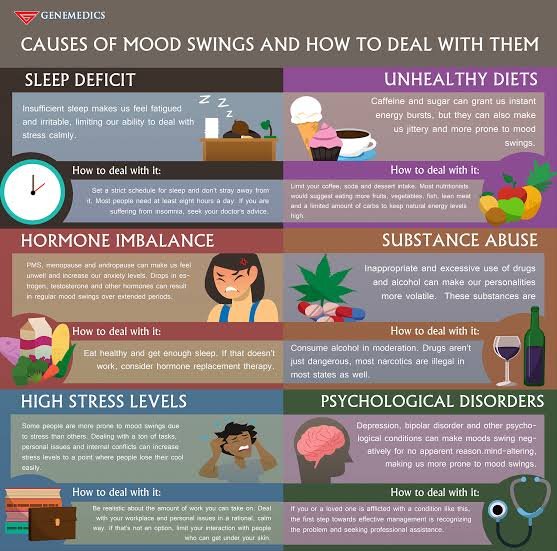It could be quite normal to have days where you feel sad, moody or perhaps overjoyed. So long your mood fluctuations doesn't interfere with your personal life to an extreme degree, it is still considered healthy. However, you could discover you have a medical condition if you discover that you switch from extremely happy to being extremely depressed on a regular basis. Mood swings are normal but when they become frequent, it needs more attention.
.jpg)
Most of the causes of rapid fluctuations in mood or behavior could be related to mental health, substances used, hormones or other health related conditions. Let's take a look at them briefly.
In most cases, mood swings and fluctuations are just a symptom of a more serious underlying health issue. Like:
- Mental health conditions
A lot of mental health conditions could be responsible for mood swings, and they usually called mood disorders. They include:
- Bipolar disorder:
A person with bipolar disorder has a lot of chances to automatically have their emotions switched from very happy to very sad. The fluctuations in mood caused by bipolar disorder would only take place just a few times within a year, even in the case of rapid cycling bipolar disorder.
- Cyclothymic disorder:
Cyclothymia or cyclothymic disorder, is a very mild mood disorder which is quite similar to bipolar II disorder. It's wrapped up with so many emotions which go high up and down but are often less severe than those related to bipolar disorder.
- Major depressive disorder:
For those with major depressive disorder, they tend to experience extreme sadness for a very long period of time. Major depressive disorder is also referred to as clinical depression.
- Dysthymia:
Dysthymia, which is now referred to as persistent depressive disorder is a chronic form of depression and it brings about relative sadness.
- Personality disorders:
For some certain personality disorders, there are strong tendencies for one to experience rapid fluctuations in mood within a very short period of time.
You may also experience mood swings if you have other mental health conditions, such as attention deficit hyperactivity disorder (ADHD), Disruptive mood dysregulation disorder (DMDD) and schizophrenia.
.jpg)
According to a review in 2011, children with mood swings are usually thought to have bipolar disorder but often end up having another condition. A doctor will be in the best place to evaluate such child and help determining an appropriate treatment schedule.
A lot, if not all mental health conditions could be managed over time, with a number of, or combination of medications, psychotherapy and lifestyle changes.
- Hormonal conditions
Hormones could also be responsible for mood swings. This is associated with hormones affecting the chemistry of the brain. Women and teenagers whom are pregnant or are in the menopause stage might experience mood swings due to the hormonal changes connected to this particular stage of their body’s development. Mood swings could also occur due to more than just hormones. If you experience extreme mood fluctuations, talking to your doctor about it should be the next thing to do, so to get a recommended treatment plan.
- Substances used
Mood swings might also pop up if you drink alcohol or use drugs. Excessive alcohol or drug use could lead to addictions that can seriously intrude into your life. A lot of programs are available to help in the treatment of substance use disorders. Substance use disorders not only affects the person with the disorder but also the loved ones and people around. For cases like this, one might actually need the help of a loved one. A doctor could provide all the helpful treatment plans to help a person get them the help they require.
Irrespective of what you think brings about your mood swings, mood swings could occur due to an underlying medical condition or another factor and certain things could also trigger them. They includes the following:
- A significant change in your life
- Diet
- Sleeping habits
- Certain medications
- Stress
So if you happen to experience severe mood swings more frequently, you should consult your doctor. It's quite important that you note when you have a mood swing and what particular activity you were involved in before it happened, as this would help your doctor in assessing it’s the result of an underlying issue or you were reacting to a lifestyle change.
To manage mood swings:
- Exercise
- Eat balanced diet foods
- Get sufficient sleep
- Avoid transferring aggression on others
- Take drugs prescribed by the doctor regularly.

A really educative piece there, thanks for sharing.
But if you say "Avoid transferring aggression on others", I now begin to wonder what makes a mood swing a mood swing.
Surely, transfer of aggression must come into the picture, (in most cases though) the focus here should be on how to arrest or manage this transfer.
Cheers!
Downvoting a post can decrease pending rewards and make it less visible. Common reasons:
Submit
If you focus on managing mood swings, there would be no transfer of aggression, as you will be in control of your mind. Thank you.
Downvoting a post can decrease pending rewards and make it less visible. Common reasons:
Submit